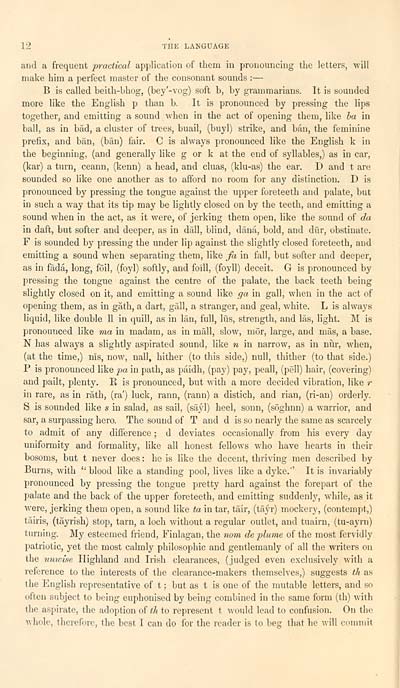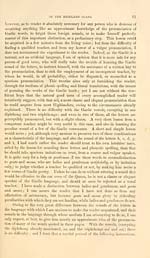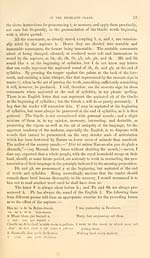Download files
Complete book:
Individual page:
Thumbnail gallery: Grid view | List view

12 THE LANGUAGE
aticl a frequent practical appliciitiou of tliem in pronouncing the letters, will
make bim a perfect master of the consonant sounds : —
B is called beith-bhog, (bey'-vog) soft b, by grammarians. It is sounded
more like the English p than b. It is pronounced by pressing the lips
together, and emitting a sound when in the act of opening them, like ba in
ball, as in bad, a cluster of trees, buail, (buyl) strike, and ban, the feminine
prefix, and ban, (ban) fair. C is always pronounced like the English k in
the beginning, (and generally like g or k at the end of syllables,) as in car,
(kar) a turn, ceann, (kenn) a head, and cluas, (klu-as) the ear. D and t are
sounded so like one another as to afford no room for any distinction. D is
pronounced by pressing the tongue against the upper foreteeth and palate, but
in such a way that its tip may be lightly closed on by the teeth, and emitting a
sound when in the act, as it were, of jerking them open, like the sound of da
in daft, but softer and deeper, as in dull, blind, dana, bold, and dur, obstinate.
F is sounded by pressing the under lip against the slightly closed foreteeth, and
emitting a sound when separating them, like fa in fall, but softer and deeper,
as in fàdà, long, foil, (foyl) softly, and foill, (foyll) deceit. G is pronounced by
pressing the tongue against the centre of the palate, the back teeth being
slightly closed on it, and emitting a sound like ga in gall, when in the act of
opening them, as in gath, a dart, gciU, a stranger, and geal, white. L is always
liquid, like double 11 in quill, as in Ian, full, Ifis, strength, and las, light. M is
pronounced like ma in madam, as in mall, slow, mòr, large, and mas, a base.
N has always a slightly aspirated sound, like n in narrow, as in nùr, when,
(at the time,) nis, now, nail, hither (to this side,) null, thither (to that side.)
P is pronounced like ^a in path, as paidh, (pay) pay, peall, (pell) hair, (covering)
and pailt, plenty. R is pronounced, but with a more decided vibration, like r
in rare, as in rath, (ra') luck, rann, (rann) a distich, and rian, (ri-an) orderly.
S is sounded like s in salad, as sail, (sSyl) heel, sonn, (soghnn) a warrior, and
sar, a surpassing hero. The sound of T and d is so nearly the same as scarcely
to admit of any diflerence ; d deviates occasionally from his every day
uniformity and formality, like all honest fellows who have hearts in their
bosoms, but t never does : he is like the decent, thriving men described by
Burns, with " blood like a standing pool, lives like a dyke." It is invariably
pronounced by pressing the tongue pretty hard against the forepart of the
palate and the back of the upper foreteeth, and emitting suddenly, w'hile, as it
were, jerking them open, a sound like ta in tar, tair, (taj'r) mockery, (contempt,)
trdris, (tayrish) stop, tarn, a loch without a regular outlet, and tuairn, (tu-ayrn)
turning. My esteemed friend, Finlagan, the nom de flume of the most fervidly
patriotic, yet the most calmly philosophic and gentlemanly of all the writers on
the unwise Highland and Irish clearances, (judged even exclusively with a
reference to the interests of the clearance-makers themselves,) suggests th as
the English representative of t ; but as t is one of the mutable letters, and so
often subject to being euphonised by being combined in the same form (th) with
the aspirate, the adoption of th to represent t woidd lead to confusion. On the
whole, therefore, the best I can do for the reader is to beg that he will connnit
aticl a frequent practical appliciitiou of tliem in pronouncing the letters, will
make bim a perfect master of the consonant sounds : —
B is called beith-bhog, (bey'-vog) soft b, by grammarians. It is sounded
more like the English p than b. It is pronounced by pressing the lips
together, and emitting a sound when in the act of opening them, like ba in
ball, as in bad, a cluster of trees, buail, (buyl) strike, and ban, the feminine
prefix, and ban, (ban) fair. C is always pronounced like the English k in
the beginning, (and generally like g or k at the end of syllables,) as in car,
(kar) a turn, ceann, (kenn) a head, and cluas, (klu-as) the ear. D and t are
sounded so like one another as to afford no room for any distinction. D is
pronounced by pressing the tongue against the upper foreteeth and palate, but
in such a way that its tip may be lightly closed on by the teeth, and emitting a
sound when in the act, as it were, of jerking them open, like the sound of da
in daft, but softer and deeper, as in dull, blind, dana, bold, and dur, obstinate.
F is sounded by pressing the under lip against the slightly closed foreteeth, and
emitting a sound when separating them, like fa in fall, but softer and deeper,
as in fàdà, long, foil, (foyl) softly, and foill, (foyll) deceit. G is pronounced by
pressing the tongue against the centre of the palate, the back teeth being
slightly closed on it, and emitting a sound like ga in gall, when in the act of
opening them, as in gath, a dart, gciU, a stranger, and geal, white. L is always
liquid, like double 11 in quill, as in Ian, full, Ifis, strength, and las, light. M is
pronounced like ma in madam, as in mall, slow, mòr, large, and mas, a base.
N has always a slightly aspirated sound, like n in narrow, as in nùr, when,
(at the time,) nis, now, nail, hither (to this side,) null, thither (to that side.)
P is pronounced like ^a in path, as paidh, (pay) pay, peall, (pell) hair, (covering)
and pailt, plenty. R is pronounced, but with a more decided vibration, like r
in rare, as in rath, (ra') luck, rann, (rann) a distich, and rian, (ri-an) orderly.
S is sounded like s in salad, as sail, (sSyl) heel, sonn, (soghnn) a warrior, and
sar, a surpassing hero. The sound of T and d is so nearly the same as scarcely
to admit of any diflerence ; d deviates occasionally from his every day
uniformity and formality, like all honest fellows who have hearts in their
bosoms, but t never does : he is like the decent, thriving men described by
Burns, with " blood like a standing pool, lives like a dyke." It is invariably
pronounced by pressing the tongue pretty hard against the forepart of the
palate and the back of the upper foreteeth, and emitting suddenly, w'hile, as it
were, jerking them open, a sound like ta in tar, tair, (taj'r) mockery, (contempt,)
trdris, (tayrish) stop, tarn, a loch without a regular outlet, and tuairn, (tu-ayrn)
turning. My esteemed friend, Finlagan, the nom de flume of the most fervidly
patriotic, yet the most calmly philosophic and gentlemanly of all the writers on
the unwise Highland and Irish clearances, (judged even exclusively with a
reference to the interests of the clearance-makers themselves,) suggests th as
the English representative of t ; but as t is one of the mutable letters, and so
often subject to being euphonised by being combined in the same form (th) with
the aspirate, the adoption of th to represent t woidd lead to confusion. On the
whole, therefore, the best I can do for the reader is to beg that he will connnit
Set display mode to: Large image | Transcription
Images and transcriptions on this page, including medium image downloads, may be used under the Creative Commons Attribution 4.0 International Licence unless otherwise stated. ![]()
| Early Gaelic Book Collections > Blair Collection > Treatise on the language, poetry, and music of the Highland clans > (24) |
|---|
| Permanent URL | https://digital.nls.uk/76236667 |
|---|
| Description | A selection of books from a collection of more than 500 titles, mostly on religious and literary topics. Also includes some material dealing with other Celtic languages and societies. Collection created towards the end of the 19th century by Lady Evelyn Stewart Murray. |
|---|
| Description | Selected items from five 'Special and Named Printed Collections'. Includes books in Gaelic and other Celtic languages, works about the Gaels, their languages, literature, culture and history. |
|---|

